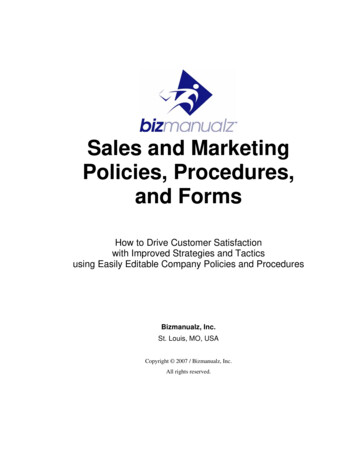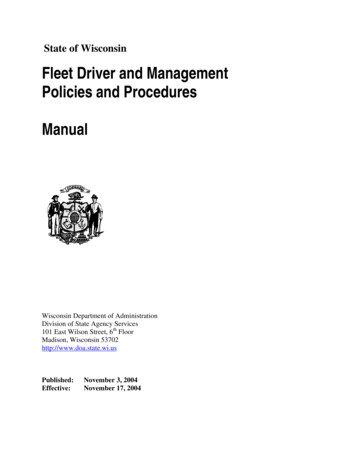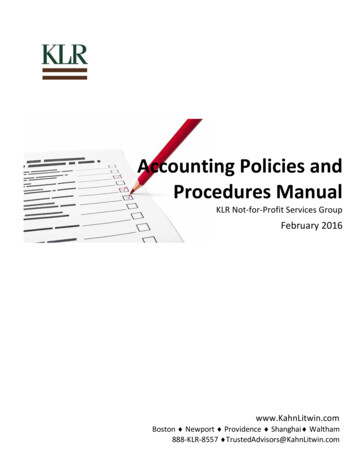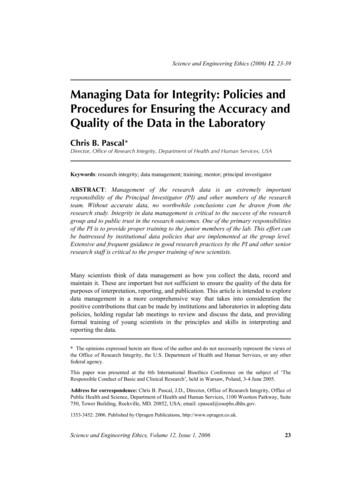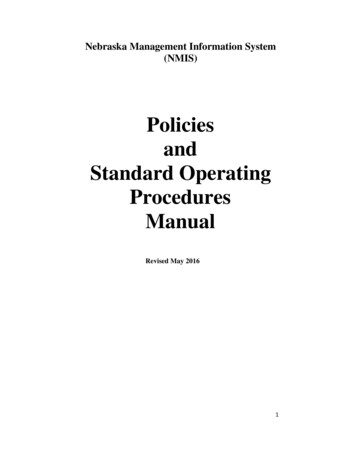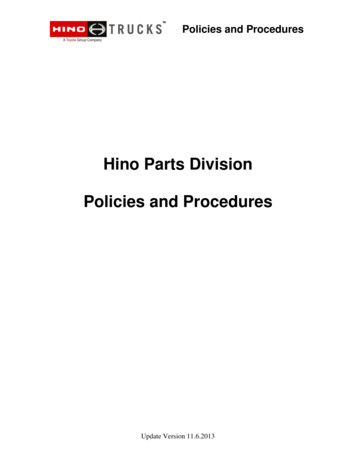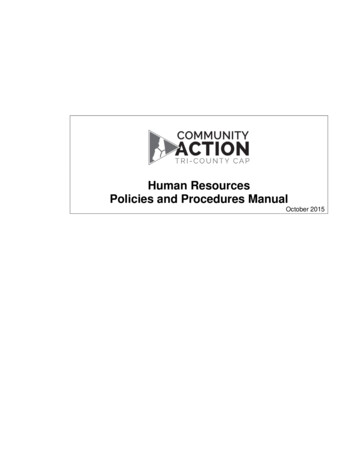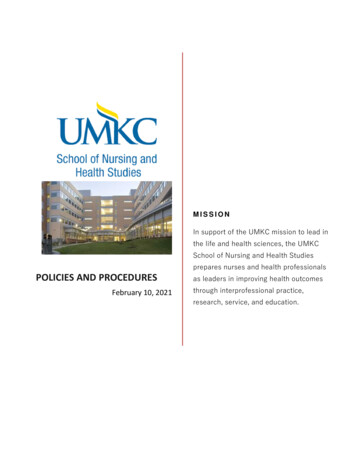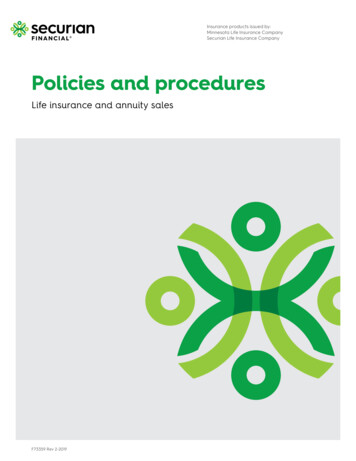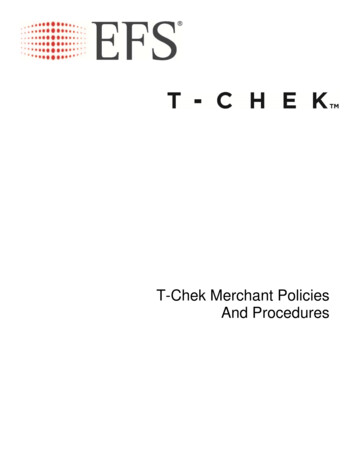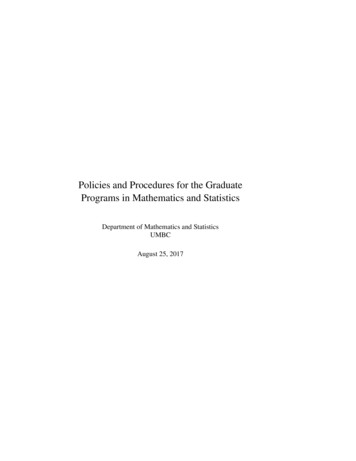
Transcription
Policies and Procedures for the GraduatePrograms in Mathematics and StatisticsDepartment of Mathematics and StatisticsUMBCAugust 25, 2017
Contents0Introduction . . . . . . . . . . . . . . . . . . . . . . . . . . . . . . .11Course Requirements . . . . . . . . . . . . . . . . . . . . . . . . . .11.1Course requirements for the MS degree programs . . . . . . .11.2Course requirements for the PhD programs . . . . . . . . . .22Advising . . . . . . . . . . . . . . . . . . . . . . . . . . . . . . . . .33The Written Comprehensive Examinations . . . . . . . . . . . . . . .33.1The Master’s WCE in Applied Mathematics . . . . . . . . . .33.2The Master’s WCE in Statistics . . . . . . . . . . . . . . . .43.3The PhD WCE in Applied Mathematics . . . . . . . . . . . .43.4The PhD WCE in Statistics . . . . . . . . . . . . . . . . . . .43.5The evaluation of the Written Comprehensive Examination . .5The PhD Program . . . . . . . . . . . . . . . . . . . . . . . . . . . .54.1Beginning the Doctoral Research . . . . . . . . . . . . . . .64.2The Doctoral Advisory Committee . . . . . . . . . . . . . . .64.3The Oral Qualifying Examination . . . . . . . . . . . . . . .64.4After the Oral Qualifying Examination . . . . . . . . . . . .75Responsible Conduct of Research (RCR) . . . . . . . . . . . . . . . .86Supported Students . . . . . . . . . . . . . . . . . . . . . . . . . . .86.1Financial Support . . . . . . . . . . . . . . . . . . . . . . . .86.2Course Requirements . . . . . . . . . . . . . . . . . . . . . .106.3Annual Contract Renewal Review . . . . . . . . . . . . . . .116.4Time Line . . . . . . . . . . . . . . . . . . . . . . . . . . . .116.5English Language Testing . . . . . . . . . . . . . . . . . . .12Appendix . . . . . . . . . . . . . . . . . . . . . . . . . . . . . . . .12A1247MS Degree Charts . . . . . . . . . . . . . . . . . . . . . . .
0 Introduction01IntroductionThis document, subsequently referred to as Policies and Procedures, describes policiesand procedures pertaining to graduate students in the Department of Mathematics andStatistics at UMBC. It either adds, expands or clarifies the requirements set forth inthe Graduate Catalog, which is the Graduate School’s official manual for UMBC’sgraduate students.The Graduate Catalog describes the university’s policies and procedures regarding admission, progression through the programs and graduation requirements. TheGraduate Catalog is frequently revised to adjust and improve its policies. The currentGraduate Catalog is available electronically s of the catalog pertaining to the Department of Mathematics and Statistics can alsobe found tudy/The Graduate Catalog is published only once every two years. The department’sversion, referred to above, is updated more frequently. Please consult the latter for themost up-to-date information.Policies and Procedures does not repeat everything in the Graduate Catalog. Ifquestions or ambiguities remain after reading this document, please consult the Graduate Catalog or talk to the Graduate Program Director.The focus of the current Policies and Procedures is on full-time students who receive financial support from the department. Many, but not all, of the policies described here apply to part-time and independently-supported students as well. If indoubt, please ask the Graduate Program Director for clarification.11.1Course RequirementsCourse requirements for the MS degree programsThe department awards two distinct Master of Science (MS) degrees: MS in AppliedMathematics and MS in Statistics. The Graduate Catalog describes the detailed requirements for obtaining these degrees. Summaries of these requirements are presented ingraphical charts in the Appendix A.As can be seen in these charts, there are several ways, or tracks, in which one canachieve the degree requirements of a Master’s degree. The student can choose the trackmost appropriate with his or her educational goals.Full-timevspart-time
1 Course Requirements1.22Course requirements for the PhD programsThe department awards two distinct Doctor of Philosophy (PhD) degrees: PhD in Applied Mathematics and PhD in Statistics. Within the statistics PhD there are two tracks:the traditional track and the biostatistics track. There are no prescribed courses for theStatistics PhD program. However the written comprehensive exams (see Section 3)in the traditional track are based on Stat601 (Applied Statistics I), Stat602 (AppliedStatistics II), Stat611 (Mathematical Statistics I) and Stat612 (Mathematical StatisticsII) while those in the biostatistics track are based on Stat601, Stat602, Stat651(BasicProbability) and Stat653 (Basic Mathematical Statistics).There is a set of prescribed courses for the Applied Mathematics PhD programwhich consists of:1. Math 600: Real Analysis2. Math 603: Matrix AnalysisThe student will be exempted from the Math 600 & 603 requirement if able topass the Master’s Written Comprehensive Examination based on prior preparation.3. Math 611: Applied Analysis4. Four of the six courses below, with at least one from each category: DE: Differential equations– Math 612: Ordinary Differential Equations– Math 614: Partial differential Equations NA: Numerical Analysis– Math 620: Numerical Analysis– Math 630: Matrix Analysis OP: Optimization– Math 650: Optimization– Math 651: Optimization5. Math 699: Independent StudyThe student is expected to take one or more Math 699 courses and make presentations to general audiences and faculty in the department based on what islearned in these studies.The courses prescribed above are only minimal requirements. In either Applied Mathematics or Statistics PhD programs, the student will take any number of courses asnecessary to carry out the dissertation research and receive a broad education at thesame time.The student is required to register for at least 18 credits of Doctoral Dissertation18 credits of Math orStat 899 are required forfor PhD degree programs.
2 Advising3Research: Math/Stat 899 during the course of study.The Graduate Catalog describes the detailed requirements and procedures for obtaining a PhD degree. Section 4 of Policies and Procedures (this document) has additional details.2AdvisingThe Graduate Program Director assigns each entering student an academic advisorfrom among the department’s full-time faculty. The academic advisor is responsible forworking with the student to set a reasonable path toward the student’s goals, monitoringthe student’s performance and progress and intervening with corrective actions whennecessary.Academic AdvisorIf, in due course, a student finds another faculty member’s academic interests moresuitable to his or her goals, the student can request a change in academic advisor byappealing to the Graduate Program Director.Students who will write a thesis, as those in the PhD program or those in the MSprogram with a thesis option, often select a faculty member other than their academicadvisor to guide the thesis work. The faculty member thus selected, becomes the student’s thesis advisor. At this point, the role of the student’s academic advisor ceasesand the responsibilities of monitoring the student’s program are transferred to the thesisadvisor.The department does not provide a formal mechanism for identifying a thesis advisor for a student. It is up to the student to seek a thesis advisor. Faculty members areat their discretion as to whether to accept the role of the thesis advisor to a student.3The Written Comprehensive ExaminationsThe Written Comprehensive Examinations (WCEs) for the Master’s and PhD programsare administered in January and August. Students can take the exam as soon as theyfeel ready for it.Old comprehensive exams are available to all students for inspection.3.1The Master’s WCE in Applied MathematicsThe syllabus of the Master’s Written Comprehensive Examination in Applied Mathematics is based on the subjects of the courses Math 600 and Math 603.Students receive a free attempt to pass the exam as they enter the program, and twoattempts thereafter.Thesis Advisor
3 The Written Comprehensive Examinations3.2The Master’s WCE in StatisticsThe WCE requirement in the MS Statistics tracks has been removed. The studentscan meet their program requirements by taking sufficient course credits or by writinga thesis or capstone project in addition to taking courses. Please refer to the GraduateCatalog for the details.3.3The PhD WCE in Applied MathematicsCandidates for the PhD program in Applied Mathematics should pass (a) the Master’sWritten Comprehensive Examination in Applied Mathematics (see Section 3.1), and(b) the PhD Written Comprehensive Examination in Applied Mathematics in one ofthe three possible categories:Differential Equations (DE) based loosely on the contents of the courses Math 612 – Ordinary Differential Equations Math 614 – Partial Differential EquationsNumerical Analysis (NA) based loosely on the contents of the courses Math 620 – Numerical Analysis I Math 630 – Matrix AnalysisOptimization (OP) based loosely on the contents of the courses Math 650 – Foundations of Optimization Math 651 – Optimization AlgorithmsStudents are allowed two attempts to pass the WCE in Applied Mathematics.3.4The PhD WCE in StatisticsThe PhD Written Comprehensive Examination in Statistics consists of two parts; Thefirst part is same for both tracks and is based on the content of the methodology coursesStat 601 and 602, the second part of the WCEs is based on the content of the theoretical courses; Stat 611 and 612 for the traditional track or Stat 651 and 653 for thebiostatistics track.In addition to the WCEs, students in the PhD biostatistics track are required to doa scientific minor. Please refer to the Graduate Catalog for more details.Students are required to pass the comprehensive examination (all parts) in at mostthree attempts. In exceptional cases, the graduate program director may allow a studentto take the exam for the fourth time.4
4 The PhD Program3.55The evaluation of the Written Comprehensive ExaminationThe evaluation method for the Written Comprehensive Examination is somewhat different from that of the traditional exams. The details of the procedure may vary, butin most cases, the faculty member who poses the exam questions makes a preliminaryevaluation of the student’s work. Then a second faculty member is asked to make anindependent evaluation. Next, these faculty members meet with the Graduate ProgramDirector and go over the details of the exam and discuss its strengths and weaknesses.Ultimately, they reach a recommendation that declares the outcome as a Fail or Pass inthe case Applied Mathematics and a Fail, a MS-level pass or a PhD-level pass in thecase of Statistics.Evaluating the CompsThe evaluators of a Written Comprehensive Examination often assign numericalgrades to the exam. These are entirely for their own convenience and are not required.There is no official grading scale or a set of cut-off points for the Written Comprehensive Examination. The outcome of an examination is decided in a “holistic” fashion,based on the overall merits of the performance demonstrated in the exam by the student.4The PhD ProgramAn MS degree is not a requirement for admission to the PhD program—an applicantwith a BS degree may apply for, and be admitted to, any of the MS or PhD programs.However, admission to the PhD program without a prior MS degree is rare. Generally,applicants without an MS degree are admitted to the MS program first. Upon successfulcompletion of the MS degree requirements, they are evaluated and reconsidered foradmission into the PhD program.All students in the PhD program, whether or not they have the MS degree, are required to pass the department’s Written Comprehensive Examination as specified in Section 3.It is not uncommon for a student who enters the PhD program with a Master’sdegree from other institutions to take one or two semesters of courses in preparationfor the Written Comprehensive Examination. A benefit of this is that the student gets toknow the various faculty, and the faculty learn about the student’s strengths and specialabilities. This helps to create the student-advisor bond that is necessary for successfuldoctoral research. Nevertheless, the choice of a thesis advisor need not be restricted tothose faculty who have served as the student’s teacher. The student should consider allfaculty in the department as potential thesis advisors.There is no fixed mechanism for finding a match from among the faculty; a multitude of factors, such as research interests, goals, academic abilities and personalityenter the decision. Often, a common bond develops when the student takes courseswith a faculty member and finds the research orientation of the faculty member appealing.Experience shows that almost always the student identifies a potential PhD advisorSelecting a thesis advisor
4 The PhD Program6and indicates a tentative interest in working with that advisor even before taking theWritten Comprehensive Examination. Experience also shows that the potential advisordoes not make a firm commitment until the student passes the Written ComprehensiveExamination with strong performance in the areas which the advisor deems most important. In any case, faculty members are at their discretion as to whether to acceptthe role of the thesis advisor to a student. Continued service of the faculty memberas thesis advisor is predicated in the student making satisfactory progress as outlinedbelow.4.1Beginning the Doctoral ResearchOnce an advisor-advisee commitment is made, the student begins working closely withthe advisor in a targeted research area. Most commonly this is done in the form of oneon-one study and independent reading and research. The advisor may require that thestudent take additional courses either in the department, or outside, to establish thebackground necessary for carrying out the intended research.During this exploratory period, the student acquires knowledge about the specialized field proposed and relevant background material. The student and the advisorformulate a research program and set goals for the student’s doctoral dissertation.4.2The Doctoral Advisory CommitteeAs early as possible during the phase described in the previous section, the studentand the advisor propose a Doctoral Advisory Committee, consisting of 4 or more faculty members (including the advisor) whose names will be forwarded to the GraduateProgram Director. The Doctoral Advisory Committee should be formed with the viewthat it will stay with the student throughout the doctoral study and research and willbe a part of the the Doctoral Examination Committee that will conduct the student’sdoctoral defense.Formation of the DoctoralAdvisory CommitteeThe Doctoral Advisory Committee will provide supervision and support throughout the time the student works on the dissertation topic. It will monitor the student’sactivities and their relevance to the program.Every semester the committee will submit a Doctoral Advisory Committee’s Progress Report to the Graduate Program Director. The report will contain the committee’snotes, observations and recommendations in regard to student’s progress. It is recommended that the committee members meet with the student, either in one sitting orindividually, to fill out the report.4.3Semi-annual progress reportsThe Oral Qualifying ExaminationIt is expected that within one calendar year after passing the Written ComprehensiveExamination the student shall take the Oral Qualifying Examination. This one-yearExam within one year
4 The PhD Program7period may be extended to three semesters upon request from the advisor but it shouldnot be delayed beyond this three semester limit.There are two objectives to the Oral Qualifying Examination:1. To verify that the scope and goals set for the PhD thesis are reasonable and aresuitable for a PhD dissertation.Exam objectives2. To verify that the student has the relevant background and knowledge necessaryto work in the proposed area, including sufficient understanding of the proposedproblem and some familiarity with current literatureThe student is expected to have prepared a written document containing a summaryof the oral presentation. The document, which will be regarded as a “thesis proposal”,must be distributed to the committee members at least one week in advance of theexamination date. The length of the document is up to the student, but as a reasonableguideline, it is suggested that it be 3–10 pages long. Variations in length and style ofthe proposal are acceptable, subject to the approval of the student’s advisor and theDoctoral Advisory Committee.Written proposalThe examination will consist of an oral presentation by the student describingthe goals of the doctoral dissertation research and an overview of the mathematical/statistical/scientific tools necessary to work toward that goal. The presentation mayinclude new findings or exploratory computations by the student, but this is not required.The presentation will be followed by a question-and-answer period where the committee may ask any questions it deems necessary to ascertain that the goals enumeratedabove are met.Although there are no strict time limits for this examination, it is generally expectedthat the oral presentation will be approximately 30 minutes, while the entire examination will be no longer than 2 hours. Note, however, that these time ranges are providedas guidelines rather than strict requirements.The committee can make suggestions to correct shortcomings or make recommendations to adjust the proposed goals. In extreme cases, the committee may declare theoutcome of the examination unsatisfactory and request that it be repeated. Failing theOral Qualifying Examination twice is sufficient cause for a student’s dismissal.If the committee deems the proposed work and the progress toward it satisfactory,the student passes the examination. An Admission to Candidacy form will then besigned by the student’s advisor and Graduate Program Director, who will then forwardit to the Graduate School.4.4After the Oral Qualifying ExaminationThe Doctoral Advisory Committee continues overseeing the student’s progress throughthe culmination of the student’s doctoral dissertation and its defense.Two attempts onlyAdmission to Candidacy
5 Responsible Conduct of Research (RCR)Near the completion of the dissertation research, a Doctoral Examination Committee should be formed according to the Graduate School guidelines and timetables. Itis expected that the membership of the Doctoral Examination Committee will includeall of the Doctoral Advisory Committee. It will also include at least one member fromoutside the department according to the Graduate School rules. Consult the GraduateCatalog for further requirements pertaining the Doctoral Examination Committee andthe procedures that lead to the dissertation defense and the awarding of the PhD degree.5Responsible Conduct of Research (RCR)All PhD students as well as MS students pursuing a thesis option are required totake the online course CITI RCR. This course is free and takes about 90 minutes tocomplete. PhD students are required to complete this course before taking their OralQualifying Exam. MS students (pursuing the thesis option) are required to completethis before setting up their defense exam. Please seehttp://research.umbc.edu/2135-2/for information.6Supported StudentsThe following additional rules and regulations apply to full-time, supported students.It is important to adhere to these rules for a successful annual contract renewal review.6.1Financial SupportThe department has funds for financial support of qualified students. A full financialsupport package includes an Academic Year (9 month) stipend, tuition remission forup to 10 credits per semester, and health insurance. Additional s
ematics or Statistics PhD programs, the student will take any number of courses as necessary to carry out the dissertation research and receive a broad education at the same time. The student is required to register for at least 18 credits of Doctoral Dissertation 18 credits of M
